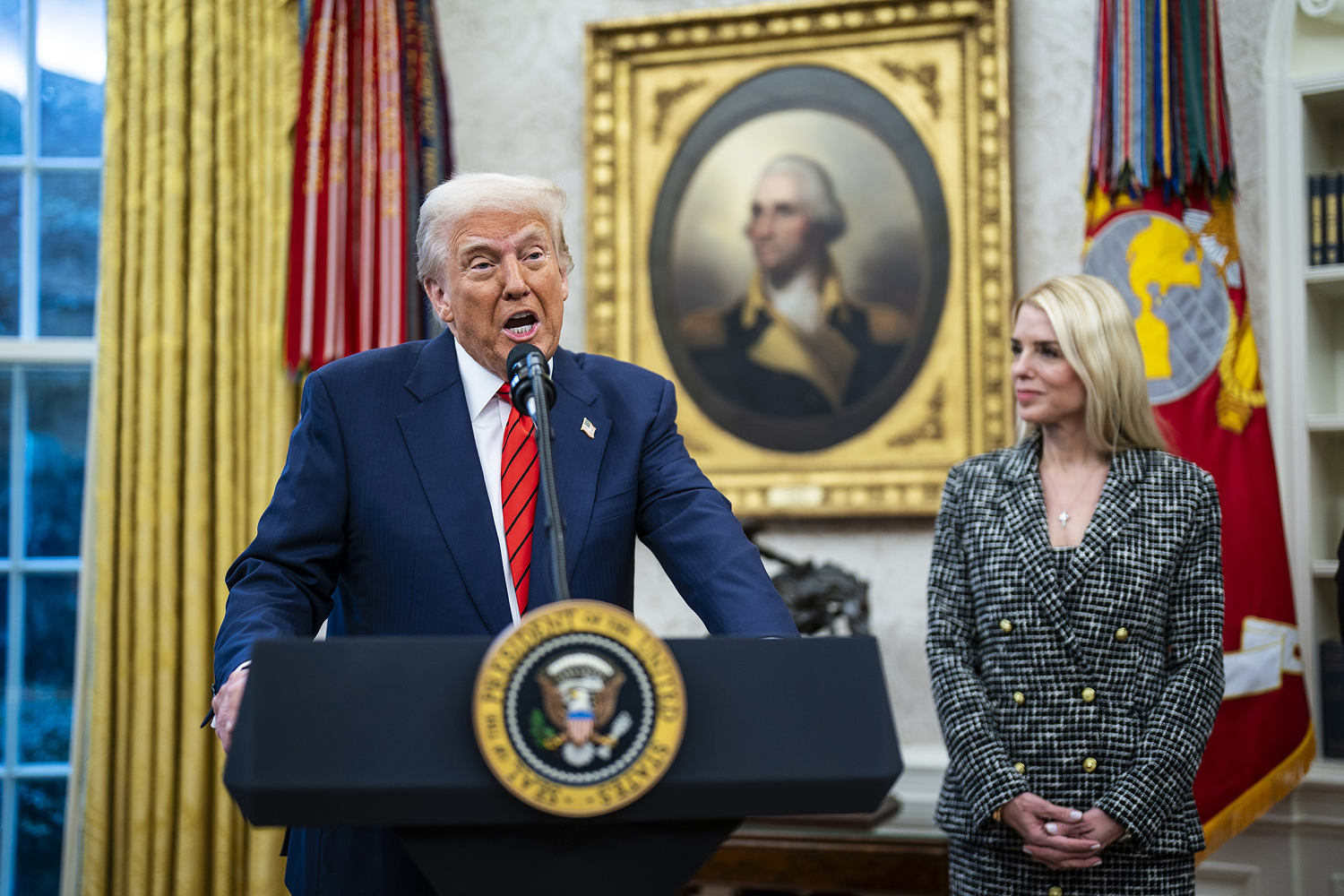The Dictatorship
Without insurance, immigrant patients may face unregulated ‘medical deportation’

ALLENTOWN, PA. (AP) — Junior Clase’s cluttered kitchen table paints a picture of his life in the United States. Scattered across it are bottles of deodorant and conditioner that he sends back to the Dominican Republic, a Spanish-language Bible and a plastic medical brace for his wife, Solibel Olaverria.
Olaverria began having intense headaches and vomiting five months after she joined her husband in the U.S. In the emergency room, she was diagnosed with a brain aneurysm; during surgery to stop it from rupturing, she suffered a stroke and was induced into a coma.
She left the couple’s Allentown row house in December 2022 and has yet to return. Clase worries she never will.
In February 2023, Clase said, hospital administrators suggested transporting his still-comatose wife to a facility back in the Dominican Republic – an option he refused.
“They told me that they could send her back to my country,” he said – even without his consent. “At that moment, she was missing a piece of her skull. … If they put her in an airplane or a helicopter, it was possible that she would die.”
Though the federal government is the only entity with the jurisdiction to remove people from the U.S., hospitals across the nation sometimes return uninsured noncitizen patients in need of long-term care to their countries of origin.
Advocates call this “medical deportation.” Hospitals and medical transport companies refer to it as “medical repatriation.” By either name, the practice exists in ethical and legal gray areas – without specific federal regulations, widespread public knowledge or a national tracking system.
Facing limited options for care, some immigrant patients and family members may voluntarily decide to continue treatment outside of the U.S. Other times, experts say, the process occurs without full consent.
Lori Nessel, a professor at Seton Hall University who supervised a 2012 report about medical repatriation, said the practice amounts to “private deportation.”
“They were essentially being deported,” she said, “but outside of the legal process for deportation, because there was no immigration court involved.”
While some foreign governments track these repatriations, data is inconsistent and doesn’t reflect whether patients wanted to return, felt they had no other option or were forced to leave.
Over the past two decades, academics, advocates and reporters have struggled to put a number on the phenomenon, which involves a tangled network of hospitals, air transport companies and consulates that work in different states and countries.
Since 2020, the Philadelphia-based Free Migration Project has tracked 19 cases of patients facing medical deportation, through referrals and a telephone hotline it runs. Six of those came in the first six months of 2025, from cities in Pennsylvania but also Florida, New Jersey and New York, according to Adrianna Torres-García, deputy director of the organization.
“We’ve had a higher volume of cases in the same span of time than any other given year,” Torres-García said. “It’s also more complex cases.”
Experts believe medical deportation happens more than tracking efforts account for, and some worry cases could now increase, given that the practice sits at the intersection of health care and immigration – two systems undergoing drastic change in the second Trump administration.
Early on, Olaverria was able to get treatment under a federal law that requires Medicare-participating hospitals to provide stabilizing care to anyone with an emergency condition, regardless of insurance, ability to pay or immigration status. Hospitals can then file for reimbursement through Emergency Medicaid.
But the tax and spending cut bill President Donald Trump signed in July significantly reduces how much the government will pay into Emergency Medicaid. The law also makes some immigrants, including refugees and asylees, ineligible for traditional Medicaid and Medicare.
Immigrants without legal status have long been ineligible for these programs, and even green card holders have to wait five years before they are eligible for Medicaid.
In effect, experts said, the changes will leave even more immigrants uninsured and provide less funding for emergency care if they need it.
“If immigrants are unable to get as much coverage, then they’re not going to be able to get as much care,” said Andrew Cohen, an attorney with Health Law Advocates, a public interest law firm in Boston. “That’s where medical deportations could really grow.”
The legal requirement to treat anyone with an emergency condition won’t go away, said Benjamin Sommers, a health policy researcher at Harvard University. But with the federal government paying less toward Emergency Medicaid, states could also decide to reduce how much funding goes to emergency care, shifting the burden to hospitals – or individuals.
Patients “get sent bills that they often can’t pay, that often are going to go to collections,” Sommers said, adding that some may even go bankrupt. “Sometimes we see hospitals diverting patients. … I think there’ll be more of that.”
Raymond Lahoud, a Pennsylvania lawyer who represents hospitals and health networks in cases related to immigration, said hospitals fulfill their obligations to treat all patients but often need to consider further options once those patients are stabilized.
“There comes a point where the hospital has done everything it medically could do, and now that person has to move on to their next step in rehabilitation or certain kinds of end-of-life care,” he said.
U.S. citizens might be discharged to other hospitals, long-term care facilities or their families. Noncitizens, with limited access to health insurance, might instead get sent to a facility in their country of origin.
Hospitals sometimes pay private medical transport companies to conduct repatriations and provide in-air care. These services routinely cost tens of thousands of dollars but may still be cheaper than long-term or indefinite care; in the U.S., inpatient hospital care cost an average of $3,132 per day in 2023, according to health policy research firm KFF.
“Unfortunately, it becomes a financial burden to the hospital,” said Craig Poliner, president of MedEscort, an Allentown-based medical air transport company that works with hospitals to facilitate medical repatriations.
Poliner insisted that MedEscort would never repatriate a patient without consent and said company officials work with hospitals to follow the American Medical Association’s discharge guidelines.
“The patients really do better in their own countries, in their own culture,” he said. “We’re not forcing anybody back. We convince them why we think it’s better. If we have the right approach, it usually resolves itself.”
However, advocates noted that immigration status, a lack of insurance, the injury or illness itself, unfamiliarity with the health care system and language barriers can hinder someone’s ability to give informed consent.
In 2013, John Sullivan, a social worker based in Tempe, Arizona, traveled to Mexico to study medical repatriation as part of a Fulbright scholarship. He interviewed patients who had been sent back, along with family members, health workers and Mexican officials.
Sullivan said the circumstances surrounding consent in some of those cases were “unclear.” “It was almost like migrants would describe feeling like they had no other choice,” he said.
Olaverria entered the U.S. on a temporary tourist visa, and when she sought treatment, she was uninsured. In the first days of March 2023, Clase said, hospital administrators gave him an ultimatum: Find care for his wife elsewhere, or they would follow through with her transfer to the Dominican Republic.
Clase said the only option he felt he had was to keep his wife where she was. He didn’t believe she would survive the flight to the Dominican Republic, and if she did, he didn’t trust that she’d receive the care she needed there. He couldn’t properly care for her at home, and she didn’t have insurance to cover the cost of another facility in the U.S.
Local advocates connected Clase with the Free Migration Project, which organized protests against Olaverria’s transfer. Outside the hospital, protesters carried homemade signs on neon-colored posters calling for an end to medical deportation.
After local media coverageClase said, hospital administrators agreed to hold off on the transfer if they could work together to find another long-term care option. The hospital did not respond to requests for comment.
Media coverage of Olaverria’s case helped bolster interest in a bill before the Philadelphia City Council to stop nonconsensual medical repatriations, and in December 2023, it became the nation’s first and only law banning the practice, according to experts.
The policy requires hospitals in the city to obtain patients’ written consent and provide information about their rights and options for care before transferring them out of the U.S. It also requires hospitals to determine whether patients are eligible for programs that could pay for their care – and, if so, help them enroll.
Philadelphia hospitals also must now report medical repatriations to the city’s Department of Public Health. Agency spokesman James Garrow said hospitals submitted five repatriation reports in 2024, the first full calendar year for which data was collected.
Claudia Martínez participated in the campaign to pass the law after her uncle faced medical repatriation. The personal photos, wedding memorabilia and Bible quotes that decorate her living room walls hang alongside a “Community Power Award” from the Pennsylvania Immigration Coalition.
“I don’t want anyone to go through what I went through,” Martínez said.
In May 2020, a motorcycle struck Martínez’s uncle, an immigrant from Guatemala. When Martínez arrived at the hospital, she found him comatose and intubated, with injuries that rendered him almost unrecognizable.
Weeks later, Martínez said, a hospital social worker asked for her uncle’s immigration status. She later learned the hospital and MedEscort planned to transfer him to a facility in Guatemala.
“I was in shock,” Martínez said. “He was intubated. … He was not in a condition to travel.”
She said she rejected the transfer in conversations with hospital officials and MedEscort, but Poliner said MedEscort got authorization for the repatriation from family members in Guatemala. Martínez disputes that.
Eventually, Martínez connected with the Free Migration Project, which organized a protest outside the hospital on the day of her uncle’s scheduled trans fer.
In the end, the medical deportation was scrapped. Ultimately, with the help of community advocates, Martinez’s uncle was able to access a form of state-sponsored insurance. He moved into a rehabilitation center and stayed for three years, until his insurance ran out.
In May 2024, his family decided it would be best for him to return to Guatemala to be at home with his wife. He can walk again but has significant memory impairments.
“He is someone who loves to joke,” Martínez said. “This, I think he didn’t lose.”
Consulates are often involved in the medical transport of their citizens, helping to secure travel documents and occasionally paying for airfare on less expensive commercial flights.
Between 2014 and 2024, the Mexican General Directorate of Consular Protection and Strategic Planning reported 8,227 medical repatriations; 328 of those took place in 2024. The data does not distinguish between patients who wanted to return and those who felt pressured or coerced.
“Sometimes the level of care that they are going to receive in their hometowns … is not going to compare to the one they receive here, and they know that – so it’s very rare that a patient says, ‘I want to leave,’” said one Mexican consular official, who did not want to be named to avoid repercussions in their ongoing work with hospitals.
If patients want to stay in the U.S., they may not know what options are available to them. Hospitals, too, may be unaware of alternatives, said Cohen, who runs a program that helps eligible immigrant patients access insurance.
In some states, immigrants who don’t qualify for federal insurance programs may be able to access certain state-funded programs instead.
“(Hospitals are) preemptively doing something that they wouldn’t even need to do if they knew about these pathways into better coverage,” Cohen said.
In May 2023, Olaverria was transferred into a long-term care facility in Allentown. Two months later, she woke up from the coma. She still cannot walk or use the bathroom on her own, and she can speak only a few words.
Later that year, Clase and his wife obtained medical deferred action, which allowed them to temporarily remain in the country. It also allowed Clase to get a work permit and Olaverria to access emergency medical assistance from the state.
Between working two jobs and attending church services three times a week, Clase keeps his ritual of visiting his wife every day. Flower bouquets rest on the bookshelf in her room.
He wipes her mouth, adjusts her neck and massages her curled-in hands. And he still tells her stories that can make her laugh.
For him, life outside this routine is virtually nonexistent. When he gets home each night, he sleeps and occasionally cries.
“This country consumes you,” he said.
Clase and Olaverria are working to apply for a visa that would allow them to stay longer. But her ability to continue in long-term care is uncertain.
Despite this, Clase carries forward, focused on the familiar paths of his daily routine, all of which lead to Olaverria.
“The majority of my time,” he said, “I dedicate it to my wife.”
___
This report is part of “Upheaval Across America,” an examination of immigration enforcement under the second Trump administration produced by Carnegie-Knight News21. For more stories, visit https://upheaval.news21.com/
The Dictatorship
Trump pushes Pam Bondi to pursue cases against his foes

Eight months into his second term, President Donald Trump’s long-standing pledge to take on those he perceives as his political enemies has prompted debates over free speech, media censorship and political prosecutions.
From late-night comedian Jimmy Kimmel’s suspension to Pentagon restrictions on reporters and an apparent public appeal to Attorney General Pam Bondi to pursue legal cases against his adversaries, Trump has escalated moves to consolidate power in his second administration and root out those who have spoken out against him.
In a post on social media this weekend addressed to Bondi, Trump said “nothing is being done” on investigations into some of his foes.
“We can’t delay any longer, it’s killing our reputation and credibility,” he said. Noting that he was impeached and criminally charged, “JUSTICE MUST BE SERVED, NOW!!!”
Criticizing investigations into Trump’s dealings under Democratic President Joe Biden’s Justice Department, Sen. Rand Paul, R-Ky., said Sunday that “it is not right for the Trump administration to do the same thing.”
Directive to Bondi to investigate political opponents
Trump has ratcheted up his discussion of pursuing legal cases against some of his political opponents, part of a vow for retribution that has been a theme of his return to the White House. He publicly pressed Bondi this weekend to move forward with such investigations.
Trump posted somewhat of an open letter on social media Saturday to his top prosecutor to advance such inquiries, including a mortgage fraud probe into New York Attorney General Letitia James and a possible threat case against former FBI Director James Comey.
He posted that he had “reviewed over 30 statements and posts” that he characterized as criticizing his administration for a lack of action on investigations.
“We have to act fast — one way or the other,” Trump told reporters later that night at the White House. “They’re guilty, they’re not guilty — we have to act fast. If they’re not guilty, that’s fine. If they are guilty or if they should be charged, they should be charged. And we have to do it now.”
Trump later wrote in a follow-up post that Bondi was “doing a GREAT job.”
Paul, a frequent Trump foil from the right, was asked during an interview on NBC’s “Meet the Press” about the propriety of a president directing his attorney general to investigate political opponents. The senator decried “lawfare in all forms.”
Sen. Chris Murphy, D-Conn., said it was “unconstitutional and deeply immoral for the president to jail or to silence his political enemies.” He warned it could set a worrisome precedent for both parties.
“It will come back and boomerang on conservatives and Republicans at some point if this becomes the norm,” Murphy told ABC’s “This Week.”
The Senate’s Democratic leader, Chuck Schumer of New York, said on BLN’s “State of the Union” that Trump is turning the Justice Department “into an instrument that goes after his enemies, whether they’re guilty or not, and most of them are not guilty at all, and that helps his friends. This is the path to a dictatorship. That’s what dictatorships do.”
The Justice Department did not respond Sunday to a message seeking comment.
Appointment of new prosecutor in Letitia James investigation
Each new president nominates his own U.S. attorneys in jurisdictions across the country. And Trump has already worked to install people close to him in some of those jobs, including former Fox News host Jeanine Pirro in the District of Columbia and Alin Habbahis former attorney, in New Jersey.
Trump has largely stocked his second administration with loyalists, continuing Saturday with the nomination of a White House aide as top federal prosecutor for the office investigating James, a longtime foe of Trump.
Trump announced Lindsey Halligan to be the U.S. attorney in the Eastern District of Virginia on Saturday, just a day after Erik Siebert resigned from the post and Trump said he wanted him “out.”
Trump said he was bothered that Siebert had been supported by the state’s two Democratic senators.
“There are just two standards of justice now in this country. If you are a friend of the president, a loyalist of the president, you can get away with nearly anything, including beating the hell out of police officers,” Murphy said, mentioning the defendants in the Jan. 6, 2021, riot at the U.S. Capitol pardoned by Trump as he returned to office. “But if you are an opponent of the president, you may find yourself in jail.”
New restrictions on Pentagon reporters
Trump has styled himself as an opponent of censorship, pledging in his January inaugural address to “bring free speech back to America” and signing an executive order that no federal officer, employee or agent may unconstitutionally abridge the free speech of any American citizen.
Under a 17-page memo distributed Friday, the Pentagon stepped up restrictions on the mediasaying it will require credentialed journalists to sign a pledge to refrain from reporting information that has not been authorized for release, including unclassified information. Journalists who don’t abide by the policy risk losing credentials that provide access to the Pentagon.
Asked Sunday if the Pentagon should play a role in determining what journalists can report, Trump said, “No, I don’t think so.”
“Nothing stops reporters. You know that,” Trump told reporters as he left the White House for Charlie Kirk’s memorial service.
Trump has sued numerous media organizations for negative coverage, with several settling with the president for millions of dollars. A federal judge in Florida tossed out Trump’s $15 billion defamation lawsuit against The New York Times on Friday.
Jimmy Kimmel ouster and FCC warning
Perhaps the most headline-grabbing situation involves ABC’s indefinite suspension Wednesday of veteran comic Jimmy Kimmel’s late-night show. What he said about Kirk’s killing had led a group of ABC-affiliated stations to say it would not air the show and provoked some ominous comments from a top federal regulator.
Host Jimmy Kimmel speaks at the Oscars in Los Angeles on Feb. 26, 2017. (Photo by Chris Pizzello/Invision/AP, File)
Host Jimmy Kimmel speaks at the Oscars in Los Angeles on Feb. 26, 2017. (Photo by Chris Pizzello/Invision/AP, File)
Trump celebrated on his social media site: “Congratulations to ABC for finally having the courage to do what had to be done.”
Earlier in the day, the Federal Communications Commission chairman, Brendan Carrwho has launched investigations of outlets that have angered Trump, said Kimmel’s comments were “truly sick” and that his agency has a strong case for holding Kimmel, ABC and network parent Walt Disney Co. accountable for spreading misinformation.
“We can do this the easy way or the hard way,” Carr said. “These companies can find ways to take action on Kimmel or there is going to be additional work for the FCC ahead.”
Sen. Markwayne MullinR-Okla., argued that Kimmel’s ouster wasn’t a chilling of free speech but a corporate decision.
“I really don’t believe ABC would have decided to fire Jimmy Kimmel over a threat,” he said Sunday on BLN. “ABC has been a longstanding critic of President Trump. They did it because they felt like it didn’t meet their brand anymore.”
Not all Republicans have applauded the move. On his podcast Friday, GOP Sen. Ted Cruz of Texas called it “unbelievably dangerous for government to put itself in the position of saying we’re going to decide what speech we like and what we don’t, and we’re going to threaten to take you off air if we don’t like what you’re saying.”
Trump called Carr “a great American patriot” and said Friday that he disagreed with Cruz.
___
Kinnard can be reached at http://x.com/MegKinnardAP.
The Dictatorship
Hegseth imposes new press restrictions, eyes greater Pentagon control over access

During a recent “expletive-laden address” at the Army War College, Defense Secretary Pete Hegseth boasted, “We are laser-focused on our mission of warfighting.” The former Fox News host did not, however, note that he was apparently referring to a domestic culture war.
During his tenure, the beleaguered Pentagon chief has invested a considerable amount of time and energy in library books. And paintings. And scrubbing Defense Department websites of articles and images about Jackie Robinson and the Navajo Code Talkers. And renaming Navy ships. And leading a Christian prayer service in the Pentagon’s auditorium. And amplifying videos about denying women the right to vote. And creating new grooming standards.
But in case that weren’t quite enough, Hegseth has also carved out time to push back against the industry he ostensibly worked in before joining the Trump administration: the news media.
As The Associated Press reported“The Pentagon this year has evicted many news organizations while imposing a series of restrictions on the press that include banning reporters from entering wide swaths of the Pentagon without a government escort — areas where the press had access in past administrations as it covers the activities of the world’s most powerful military.”
Late last week, these efforts took a dramatic turn for the worse. NBC News reported:
Journalists who cover the Defense Department at the Pentagon can no longer gather or report information, even if it is unclassified, unless it’s been authorized for release by the government, defense officials announced Friday. Reporters who don’t sign a statement agreeing to the new rules will have their press credentials revoked, officials said.
I’m mindful of the fact that Donald Trump and his team have launched a radical offensive against the First Amendment and its protections for the free press, but that doesn’t make the developments at the Pentagon any less ridiculous.
Sen. Jack Reed, D-R.I., a military veteran and ranking member on the Senate Armed Services Committee, called the restrictions “an ill-advised affront to free speech and freedom of the press.”
“Secretary Hegseth’s restrictions on the press are part of a broader attempt by this Administration to cover up missteps, stifle independent journalism, and obscure the truth,” Reed said. “American journalists are not, should not, and must not be mere stenographers for the party in power or the Pentagon itself.”
The senator’s use of the word “stenographers” was especially notable because it summarized the underlying problem nicely: Hegseth’s policyfor all intents and purposes, requires professional journalists to publish only what the Defense Department has approved for public release.
That might very well make the secretary happy and improve his job security — Hegseth has been humiliated in recent months from revelations that emerged from sources within the Pentagon — but this isn’t how things are supposed to work in the United States.
Even some Republicans acknowledged the absurdity of the demand.
Rep. Don Bacon of Nebraska, whose looming retirement seems to have made it easier for the congressman to speak candidly, wrote online“This is so dumb that I have a hard time believing it is true. We don’t want a bunch of Pravda newspapers only touting the Government’s official position. A free press makes our country better. This sounds like more amateur hour.”
Whether the pushback prompts a change in direction remains to be seen. Watch this space.
Steve Benen is a producer for “The Rachel Maddow Show,” the editor of MaddowBlog and an BLN political contributor. He’s also the bestselling author of “Ministry of Truth: Democracy, Reality, and the Republicans’ War on the Recent Past.”
The Dictatorship
Why Trump’s directive to AG Bondi should be seen as an impeachment-level scandal

Imagine a scenario in which an investigative reporter uncovered a secret document from the White House. The document, in this hypothetical, showed Donald Trump quietly directing his attorney general to manufacture criminal cases against his political foes, without regard for evidence or propriety, as part of a brazenly corrupt and overtly authoritarian scheme.
In this scenario, the investigative reporter who obtained this secret document would, in a normal and healthy democracy, have a scoop for the ages. The public exposure of such a document would instantly become the kind of story that would rock the political system, spark heated congressional hearings and generate questions about possible resignations.
But in 2025, there’s apparently no need for an investigative reporter to uncover a clandestine plot — because the president published his scheme online for all the world to see. The New York Times reported:
President Trump demanded on Saturday that his attorney general move quickly to prosecute figures he considers his enemies, the latest blow to the Justice Department’s tradition of independence. ‘We can’t delay any longer, it’s killing our reputation and credibility,’ Mr. Trump wrote in a social media post addressed to ‘Pam,’ meaning Attorney General Pam Bondi.
The online missive was head-spinning in its absurdity. Trump began his message, “I have reviewed over 30 statements and posts saying that, essentially, ‘same old story as last time, all talk, no action. Nothing is being done. What about Comey, Adam ‘Shifty’ Schiff, Leticia??? They’re all guilty as hell, but nothing is going to be done.’”
In other words, to hear the president tell it, he saw some “posts” from unnamed people who want some of Trump’s political adversaries to be punished, because they’re “guilty” of unidentified crimes, and these “posts” should necessarily spur action from the Justice Department, because the president said so.
Concluding that “they” impeached him and tried to hold him accountable for a variety of alleged felonies, the Republican concluded that he’s desperate to turn the tables on his enemies. “JUSTICE MUST BE SERVED, NOW!!!” he wrote.
In case that was too subtle, Trump spoke briefly with reporters soon after, one of whom asked whether he was criticizing Bondi for not having already gone after his domestic adversaries. “No, I just want people to act,” the president replied. “They have to act, and we want to act fast. … We have to act fast.”
The Times’ report added, “Even for a president who has shattered the traditional norms of maintaining distance from the Justice Department, Mr. Trump’s unabashedly public and explicit orders to Ms. Bondi were an extraordinary breach of prosecutorial protocols that reach back to the days following the Watergate scandal.”
The Watergate reference is notable in large part because it helps contextualize the gravity of the circumstances: Trump isn’t just being accused of trying to weaponize federal law enforcement, he’s publicly flaunting his efforts.
His online directive was, for all intents and purposes, a confession in which he freely acknowledged his guilt. “Yes, I admit that I’m pressuring my attorney general to prosecute my political foes,” the president effectively declared. “And I’d prefer it if she hurried up and satisfied my hunger for revenge sooner rather than later.”
There’s no precedent in the American tradition for such explicit corruption of the rule of law. It is the stuff of impeachment resolutions. It is a brazen display of a desperate man who believes he’s both above the law and freed from the burdens of accountability.
Steve Benen is a producer for “The Rachel Maddow Show,” the editor of MaddowBlog and an BLN political contributor. He’s also the bestselling author of “Ministry of Truth: Democracy, Reality, and the Republicans’ War on the Recent Past.”
-
Uncategorized10 months ago
Bob Good to step down as Freedom Caucus chair this week
-

 The Josh Fourrier Show11 months ago
The Josh Fourrier Show11 months agoDOOMSDAY: Trump won, now what?
-

 Politics7 months ago
Politics7 months agoFormer ‘Squad’ members launching ‘Bowman and Bush’ YouTube show
-

 The Dictatorship7 months ago
The Dictatorship7 months agoPete Hegseth’s tenure at the Pentagon goes from bad to worse
-

 Politics11 months ago
Politics11 months agoWhat 7 political experts will be watching at Tuesday’s debate
-

 The Dictatorship7 months ago
The Dictatorship7 months agoLuigi Mangione acknowledges public support in first official statement since arrest
-

 Politics11 months ago
Politics11 months agoHow Republicans could foil Harris’ Supreme Court plans if she’s elected
-

 Politics7 months ago
Politics7 months agoBlue Light News’s Editorial Director Ryan Hutchins speaks at Blue Light News’s 2025 Governors Summit



